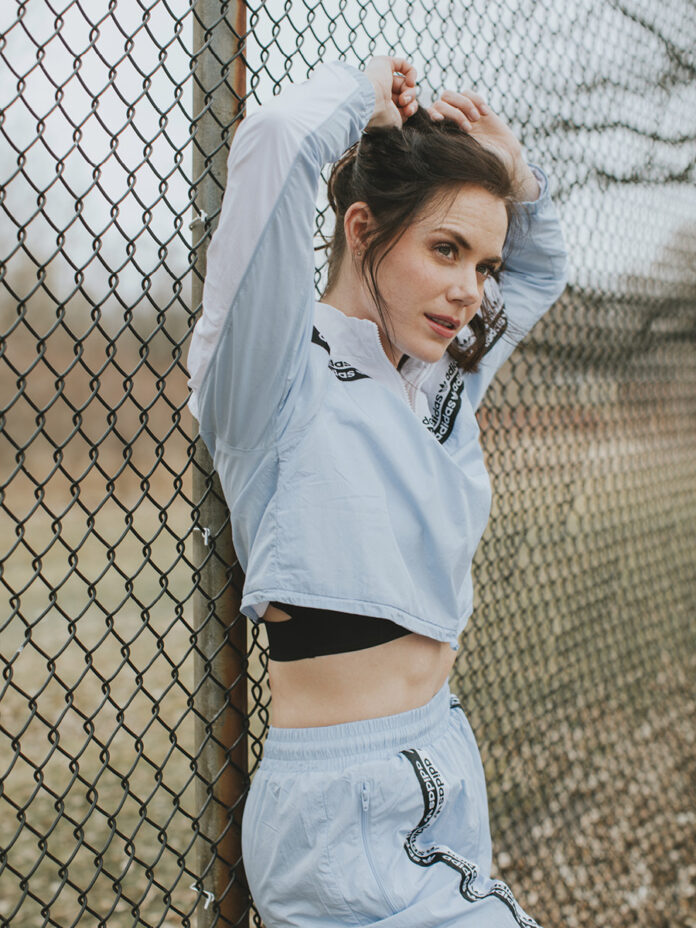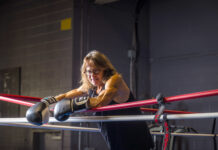
You might think it’s been an easy road to the top for Canadian ice dancer Tessa Virtue – she’s beautiful, talented, graceful and poised. But she’s the first to admit her life isn’t perfect.
Off the ice she says she’s incredibly clumsy and gets motion sickness from things like elevators and sometimes, even from the lifts she did with partner Scott Moir. And she’s faced injuries, disappointment and frustration along her journey to success.
But you don’t get to the top without finding a way through these minefields and learning how to overcome them is what made her a champion.

Ice skating is a metaphor for life: you push off, fall, get up and try again. No one knows this better than an Olympic ice dance champion like Tessa Virtue. But after 22 years on the ice, she’s ready to tackle some new challenges.
“We’d ticked all the boxes in the skating world and wanted to move on while we still felt passionate about skating,” Virtue says of her and partner Moir. “It just feels like the right time.”
This fall, Virtue and Moir have been on a goodbye tour across Canada called Rock the Rink and on Nov. 23 they’ll give their last public performance in St. John’s.
Virtue says while she’s grateful for what she’s achieved, she’s ready to step out of the skating world and start another chapter of her life.
“It’s time to start filling in the gaps with things I couldn’t do because of skating,” she says. “I have an entrepreneurial spirit. I’ve been my own boss as a skater and I’m looking forward to navigating the business world.”
Virtue is currently completing an undergraduate degree in psychology and will then be pursuing an executive MBA at Queen’s University. She’s already stepped part-way into the business world, working with several sponsors and taking on a number of collaborative opportunities. In addition, she plans to continue her work as a mentor with FitSpirit, to inspire young female athletes to stay in sport.
Letting go and moving on
Facing the end of such an integral part of her life hasn’t been easy. And once the duo decided to step down from competition after the 2018 Olympic Winter Games in Pyeongchang, Virtue struggled with her new reality.
“The most significant transition [for me] was ending the Olympic cycle where you’re working with a group of 15 people and have a singular focus,” Virtue explained. “Leading up to the Olympics, every part of your life is focused on the goal of winning an Olympic championship which makes things simple and complex at the same time. Every single moment of your life is accounted for.”
Virtue says afterward she was left with a different sense of self and had to figure out how to find meaning in that.
“How do you define success going forward,” she asks, “when being the best in the world was the goal for so long?”
Virtue responded by becoming insanely busy in 2018 and in retrospect says it was too much. This time, when she finishes her last performance in St. John’s, she’s ready and eager to go forward. She has a support network in place, plans made and goals set.
Staying Motivated to Succeed
As an athlete, Virtue says it wasn’t always easy staying motivated to keep training day after day, year after year.
“What I realized is how much power there is in delayed gratification,” she says, “which is something our society doesn’t really value. I felt sick and anxious every morning before practice knowing it would be gruelling,” she explains. “It was really uncomfortable. So I started working with a mental preparation coach to learn how to feel comfortable even when I was uncomfortable. I’d ask myself ‘How do I want to feel walking out of the arena?’ Or ‘What will make me proud?’
Dealing with Failure
While Virtue and Moir won plenty of titles, there were just as many or more disappointments and setbacks. She had two surgeries on her legs for overuse injuries, they failed to win gold at the 2014 Olympics, faced judging controversies and stepped back from skating for a time.
“These are the moments that define us,” Virtue says. “Every failure let us be better in the future. Embracing it gave us a chance to pause, pivot and reflect. Rarely do we pause to reflect on failure.”
Virtue and Moir grew to celebrate their failures realizing they were just another stepping stone to future success.

Mental Toughness
No one knows more about mental toughness than Virtue and Moir at the 2018 Olympics. Trying to make a come-back after stepping briefly out of the sport, they felt intense pressure to succeed.
“It’s a seven minute sport,” Virtue says of ice dance, “three minutes for the short program and four minutes for the long. It’s impossible to stay focused every single second. I felt more vulnerable and exposed than ever before waiting to perform in 2018.”
“Mental toughness is all about being prepared – there’s no better feeling,” she says. “Putting in the practice ahead of time, nourishing your body and managing your inner dialogue are all crucial. You want to be thinking ‘bring it on!’”
“Before the 2018 Games, my mantra was ‘I’m unstoppable,’ yet at the same time there was a little voice saying ‘Oh no! This is not going to go well.’ Right before competing [at the 2018 Olympics] I would gladly have parachuted out of the arena! But I had to quiet the noise in my mind and focus on my preparation.”
“We were so laser-focused, more prepared than ever before in our career … and it was the first time I felt the momentum from the crowd. It’s something you can get a sense of in other sports but ice dancing just doesn’t have it. I remember feeling chills after we skated.”
Be the Best Version of Yourself
Although she won’t be training as a skater any longer, Virtue plans to stay active and is looking forward to playing more golf and tennis. She’s admits to being addicted to her Peloton® stationary bike and may buy herself a road bike.
“I’d also like to get involved in a recreational team sport and explore that dynamic, as opposed to being on a team of two! ” she laughed. “I’ll never be in such good shape as I was for the Olympics and I’m okay with that. But I still want to be the best version of myself that I can be.”
While gym workouts aren’t on her agenda (“the gym was my job”) Virtue says it will be a relief to exercise for the pure pleasure of it.
“It will be nice to not have every exercise be so functional and to get in touch with my body,” she says. “It’s like a weight has lifted. This time it’s just for me.”
Over her career Virtue has had many memorable moments and some of them were just from knowing they had the grit to put in the necessary work.
“There were so many 6 a.m. mornings in grubby, empty hockey rinks … we’d be warming up and just at peace together,” she recalls.
Having conquered the word of ice dance and learning what it takes to get to the top, Virtue has all the skills to succeed as she goes boldly forward. And although she and Moir will be missed on the ice dancing scene, their contributions to the sport and legendary performances won’t be forgotten.

Tessa Virtue & Scott Moir
Championship Wins in Ice Dance
Olympic Winter Games
2018
- GOLD (ice dance)
- GOLD (team)
2014
- SILVER (ice dance)
- SILVER (team)
2010
GOLD (ice dance)
World Figure Skating Championships
- 2017 – GOLD
- 2013 – SILVER
- 2012 – GOLD
- 2011 – SILVER
- 2010 – GOLD
- 2009 – BRONZE
- 2008 – SILVER
- 2007 – 6th
ISU Four Continents Championships
- 2017 – GOLD
- 2013 – SILVER
- 2012 – GOLD
- 2009 – SILVER
- 2008 – GOLD
- 2007 – BRONZE
- 2006 – BRONZE
ISU Grand Prix Final
- 2016 – GOLD
- 2013 – SILVER
- 2012 – SILVER
- 2011 – SILVER
- 2009 – SILVER
- 2007 – 4th















